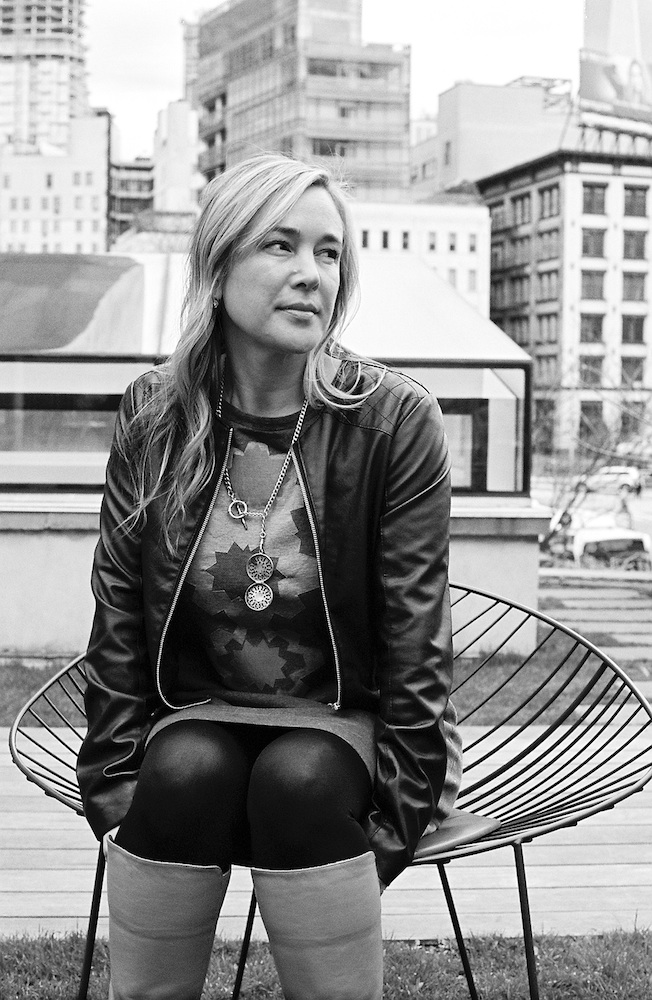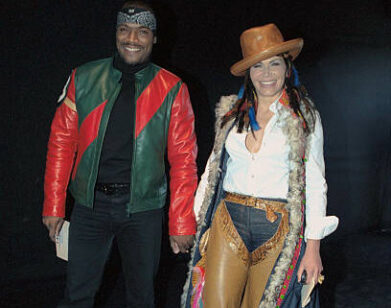All About You

VENDELA VIDA IN NEW YORK, APRIL 2015. PHOTO BY LILI PEPER.
Great novels are not a scarcity, but great voices are hard to find. Among contemporary authors, one of the most intriguing and distinctive voices to come along in fiction belongs to Vendela Vida. It is rare to find a writer who can pack so many weapons into such lean novels—they’re funny but deadly serious; they’re so confident in tone and yet one feels in constant peril of the unknown or unexpected occurring on the next page; the prose is taut and disturbingly direct, but she paints in extreme detail entire fraught communities and countries. If Vida has a comfort zone, I’ve never been able to figure out what it is.
What I can figure out is something of a narrative theme that unites her novels: a female protagonist trying to move forward—emotionally, mentally, physically, and across a foreign landscape—even as she’s pulled back. Not to turn the prolific output of the 43-year-old writer (and co-founder of the San Francisco-based literary journal The Believer) into a psychogram, but there remain resonating questions of escape—through alternative identity quests, through travel, through willful amnesia, through untested situations. Her latest novel might be her finest. Out today by Ecco, The Driver’s Clothes Lie Empty begins with an unnamed protagonist on a plane to Casablanca escaping some grim event. Told in the second person, it isn’t long before Vida’s traveling “you” becomes the victim of a theft: her bag with her money and passport are stolen as she attempts to check into her hotel. Lacking the only dependable supports in a foreign country (ready funds and verification of one’s own identity), the protagonist unlocks her step and begins to assume other identities and other selves; one of the more cunning sections of the novel has her working as a stand-in for a leading Hollywood actress on an on-location film set. It takes creative insight to get readers to care and even empathize with a main character we can’t even name. But as one of the actress’s bodyguards says during a discussion on evolution, “extreme circumstances require radical change. If you want to survive at least.”
I met up with Vida this past April on one of her visits to New York. We sat outside on a gray spring afternoon on a hotel deck in SoHo. I drank eight coffees. Vida had one tea.
CHRISTOPHER BOLLEN: My first question is about the second person. The only other novel in recent history I can think of that managed to so spectacularly tell a story entirely in the second person—you—is Jay McInerney’s Bright Lights, Big City.
VENDELA VIDA: There are also some great Lorrie Moore stories that are in second person. I really love her work. But it wasn’t like I woke up one day and thought, “I know what I want to do. I want to write a second-person book.” It was more that I felt, for this particular story—especially because it’s about the malleability of identity—that I didn’t want the female character to have a name or be an “I” or a “She.” Instead I wanted to put the reader immediately in the protagonist’s shoes. That’s why it’s “you.” And I got really used to the “you,” and started to appreciate the immediacy of it because the book is supposed to be immediate. It’s in the present tense. With every book, I try to challenge myself in some way. Whether it’s the choice of perspective or voice or tense. For this book, the challenge I set for myself-or one of them anyway-was the second person. And I actually re-read Bright Lights, Big City last summer when I was working on it… It totally holds up as a novel.
BOLLEN: McInerney’s short stories are good too. I don’t think he gets enough credit as a short-story writer. Anyway, your “you” does work. It definitely takes a minute—or a page or two—as the reader to shift into that pronoun because it is by far the least familiar. I, we, they, he, she, it—that’s the usual voice of fiction. You is almost like an accusation. I was curious how you were going to navigate the entire story is this voice: “Is Vendela going to tell me what I—as you—am wearing?” But it just became really fluid and natural for the reader to accept. I’m wondering if the you offered any hidden hurdles or tactical problems?
VIDA: There weren’t many hurdles. The biggest hurdle actually was that, in an earlier draft, it took readers a beat longer to get into the voice because I didn’t use “you” in the first sentence. I think my original first sentence was a question like, “Why is everyone clapping?” So by the time they got to “you,” they were thrown off. I realized the trick was to actually introduce this as quickly and as immediately as possible.
BOLLEN: Could you picture your nameless narrator? Did you have a clear image of her face in your head as you wrote her?
VIDA: Yes. Her body was fully formed, too. I knew early on that I wanted her to have had a bad complexion when she was younger and have acne scars and, as a result, have gotten interested in diving. It’s a sport where her body is judged, instead of her face. I wanted her to be very physically attuned to her body, because it was the only thing she had control over.
BOLLEN: How did you decide on Morocco as the setting? This isn’t your first novel overseas—or even in a Muslim country. Did you fly to Morocco on a fiction mission?
VIDA: I didn’t go there planning on setting a book there at all. But, while I was there… well, I won’t go into too much detail about my personal experience because this book is not autobiographical. There was an incident, however, and I had to go to the police station and got to meet the police chief of Casablanca. And while this was happening—while I was talking with him at the police station—I was strangely thrilled because suddenly this vague idea I had about a book clicked into place. I was the happiest victim of a crime you could ever imagine.
BOLLEN: So you were taking notes while filing a complaint?
VIDA: I was looking around at the office, taking notes in my head the whole time. But I’d had this idea for a story for a while, and it was right there that I finally saw the opening, my entrée into it. You know, some of my favorite books have thefts in them—so many of Paul Bowles’s stories have a theft. I just wrote a foreword to a new edition of The Delicate Prey, his short-story collection, and I noticed that in every single story someone is robbed of something—whether it’s a small violation like two cigarettes, or a death. Marguerite Duras has thefts in her books, too.
BOLLEN: And so does Patricia Highsmith.
VIDA: I really loved the idea of a theft starting a plot. So that became the first act.
BOLLEN: I was reading your novel while I was traveling to London, and the opening of your book is so true to symptoms of the jet-lagged traveler. You’re vulnerable when you first enter a foreign country. You can barely keep account of yourself let alone your passport and bags.
VIDA: You’re jetlagged. You’re confused. You’ve been in this small space. And then you’re suddenly exposed to this enormity of a place. You’re like a guinea pig that’s gone out in the world—”What happened to my cage?” Also, you haven’t changed money yet, so you literally don’t have currency to make yourself a citizen who’s engaging in the world yet. You have a credit card, but you don’t actually have the money. I love books that start with an arrival in a foreign country. And I’m guilty of that opening in a couple of my novels now. I also tend to love plays because they start at the last possible moment. You can’t start any earlier or else you’re going to get drowned in backstory. Someone walks in the door and something’s happened. I feel the same thing is true with a plane arrival. You land in the country and you’re there. The physical you has arrived and the mental you has to catch up.
BOLLEN: You sort of lose your past as soon as you land in a foreign country. It’s a fresh start, all forward motion. Well, you’re racking up destinations like Graham Greene did. Your first book was set in New York and California.
VIDA: With a short trip to the Philippines.
BOLLEN: The second novel took place in Finland. The third was in Turkey. Did you have any feeling before you started the new book of, “Okay, I can’t do another book set in a foreign country?” Or was it the opposite, “keep traveling.” Because a Vida reader can in some way imagine the last three books as a trilogy of sorts.
VIDA: I feel like there’s a connection between all my books. I keep mentioning Bowles because I was immersed in his work. Recently, in a Paris Review interview, he said—I’m paraphrasing—that if he hadn’t traveled, he didn’t think he would have been a writer. It was the travel that made him a writer. In some ways when I’m writing a book, the ideas come from the landscape. It’s not some arbitrary plot that was injected onto a place. For example, in Let the Northern Lights Erase Your Name, everything about it was dictated by the landscape: the mystery, the stark truths of her past, all that. It all rises from the landscape. So, for me, landscape isn’t just inspirational, it’s essential.
BOLLEN: Do you think you’d have difficulty setting a novel in San Francisco, or on the streets of your everyday life? Do you need that unfamiliarity to unleash the imagination?
VIDA: I don’t know if it would hold my interest for long enough. I think if I were living somewhere else, then I could write a novel about San Francisco. I don’t think I could write about it while living there because I wouldn’t be able to have the whole world in my head. If you write about a place you’ve been to, you can create a world in your head. But I think if you’re writing about a place you’re existing in on a daily basis, the reality of the place is continually interrupting and puncturing the creation of that world. For some writers, I’m sure that experience of the day-to-day helps inform their novels. But I don’t think I respond the same way.
BOLLEN: Some writers can never fictionally leave their own neighborhoods. Did you write most of this book in San Francisco?
VIDA: I wrote most of it in Idaho, actually….
BOLLEN: Like Hemingway.
VIDA: I wish I could say it was like that. Idaho is a place I grew up going to. And I felt my kids might like to go to some of the bison ranches and do some camping while I was stuck at home writing. So my kids went on day-long excursions with their dad. And I was inside working.
BOLLEN: How long after your trip to Casablanca was Idaho?
VIDA: A while. I’ve been circling this novel for a while, although I started writing almost immediately after that trip—on my way back from Casablanca in fact.
BOLLEN: Does a single visit to a place tend to be enough for you? Or do you need another trip to gather more details?
VIDA: Usually I take a lot of pictures when I’m traveling. I even take pictures of street signs and ads, anything. I think those are the most interesting and helpful tools for novels. But my camera had disappeared [laughs] among other things.
BOLLEN: Oh, so now we’re finding out the root of the mystery.
VIDA: I felt like I couldn’t use the tool I usually rely on. At one point I did think, “Oh, I have to go back to Morocco,” but instead I went to the library and got all of these Moroccan travel DVDs. It was really helpful to watch these videos, especially about the souks. I wanted to remember what they sold in the bazaars. I remember feeling lost in the maze of the souks in Meknes, this city I visited. But I couldn’t remember everything they were selling.
BOLLEN: Did you feel any particular sensitivity or caution when describing Muslim countries or people? It’s different to describe white Americans in novels when you’re a white American. You can take all the liberties you want. But for any novelist, I’m not sure that holds true when you go overseas.
VIDA: You definitely have to be sensitive. In fact, in the very beginning of the book, the narrator sits down on the plane next to a handsome businessman who has both an Arabic and English-language newspaper on his lap. But I made it vague where he’s from or anything about him because I actually wanted it to be like the world you get thrown into—where you aren’t sure where people are from. It could be an American businessman or it could be someone returning back home to Morocco after a business trip. I wanted that to blend together in a way that the reader could actually decide on their own who this person was.
BOLLEN: And that holds true for the main character—she continually shifts and trades identities. She is many different women through the course of the book. Her identity, name, context, job, financial state, and future are entirely up for grabs. I imagine that must be the most challenging part of writing that character: creating a believable situation where she can morph like she does.
VIDA: It was tricky to do it in a way that the reader would accept. I watch a lot of movies when I’m writing and when working on this book I rewatched The Talented Mr. Ripley. It’s such a great film. But I also re-watched one of my favorites, Antonioni’s The Passenger, and that was really helpful to me to see how this transition could happen. Those films made me realize that it doesn’t require much work to convince the audience that a character could morph radically in a short period of time. But what it takes is an action. You have to justify the action. If someone’s in a desperate situation, they’re going to take desperate measures. Their primal instinct to take care of themselves.
BOLLEN: And you don’t have to sell it to the nth degree.
VIDA: Right. You just have to make sure that the reader is in the character’s mindset enough to understand why they might do what they do.
BOLLEN: There’s a Hollywood actress, slightly spoiled, sincere, or not so sincere, midway through the book. How did she enter the narrative?
VIDA: I’ve spent some time on film sets, and I’ve written a few scripts. I’ve always been fascinated by, first of all, how boring being on a movie set can be. [laughs] People think it’s all “Lights, camera, action!” But there’s so much standing around. I’ve always been intrigued by the artifice, the lengths you have to go to to create an artificial world that looks real. For example, in the novel, there’s the traffic scene in the film shoot. And even though there’s traffic everywhere, they have to manufacture traffic, movie traffic. They have to block traffic off to make traffic so they can film it. In the same way, I’ve always wanted to write about stand-ins—people who stand in for the actors on set.
BOLLEN: Are stand-ins credited?
VIDA: They are. I met someone recently who worked on Secretary many years ago. She might have been a costume-helper originally, but they decided to make her Maggie Gyllenhaal’s stand-in because she was a similar size, and because they didn’t want to exhaust Maggie Gyllenhaal. I thought that was so interesting; a stand-in can just be someone on set who has the same dimensions. It’s all it takes in some cases. And they have to be affable enough for people to want them around. People are shooting them for five weeks and they can’t be drawing a lot of attention to themselves. They actually have to know their place, know what the boundaries are. Affable, quiet, patient, and the right size—it’s an interesting job description.
BOLLEN: For every scene, there’s a stand-in who blocks the action for the director. You never think about that person, that ghost of the main actor.
VIDA: Right. And especially if it’s shot in public, you can’t have Sandra Bullock standing on a corner. You need a stand-in so they don’t draw a crowd. If it’s someone the public doesn’t recognize, no one stops for very long.
BOLLEN: Did you base the actress on any specific star?
VIDA: She’s not based on anyone. The actress is actually one of my favorite characters. I wanted to make her really likeable, but also make it so you could see why she’d gotten to where she has. She’s like a rocket just released into the world and is very funny and charming and also knows how to make people feel love so she can get what she wants out of them.
BOLLEN: The idea of reenactment in your book reminded me of Tom McCarthy’s The Remainder, that feeling of stability that comes from repeating scenes over and over.
VIDA: I love that book. I kept meaning to reread it while I was writing this book, but then I was afraid of re-reading it.
BOLLEN: I’m amazed you even allowed yourself to watch Ripley. I have a fear when I’m writing of reading books that have similar themes or devices…
VIDA: Your ideas won’t seem as original or something?
BOLLEN: More like, I’ve seen how they did it successfully and now I won’t be able to figure out the way on my own.
VIDA: That’s why I find film really exciting and useful to watch when I’m working on books. Film is just a different way of seeing. I had a professor who said to me, “If you ever get stuck in how to tell a story, just think of what it would look like in a different medium.” So I think about what a scene, a novel, a beginning would look like if it were a film. If this were a play, what would happen here? And I think about that device a lot.
BOLLEN: And there is one cameo in your novel by an actual famous person, Patti Smith.
VIDA: I love her.
BOLLEN: For some reason, I was worried something bad was going to happen to Patti Smith in your book. [laughs]
VIDA: You can’t do that to real people. The narrator goes to a concert with the famous American actress, and I make it a Patti Smith concert. I toyed with the idea of making it an invented rock star, a fictional character, but then I thought there’s something so great about that, between this very fake and contrived American actress and the realness of Patti Smith.
BOLLEN: Right. She’s the authentic character, the real artist.
VIDA: It wouldn’t have felt authentic to insert a fake musical icon. And the whole point is that Patti Smith represents authenticity. I describe her nails as un-manicured and the hands of a serious musician as opposed to the famous American actresses who has perfectly manicured nails and who is somewhat artificial.
BOLLEN: People have told me they feel a thriller-ish aspect to the book, and I think I know what they mean. But it doesn’t really follow the usual genre arc of a thriller. In all of your books, I can never figure out which way they will go, what will happen next. I mean that as a compliment. Do you know where they are going?
VIDA: I know the acts—I knew the three-act structure that I wanted, but I only had a vague idea of exactly where it was going. And I like that because I think the hardest thing when you’re writing, when you’re by yourself, is keeping yourself interested and also not putting restrictions on the characters, not being a puppeteer that’s making them act a certain way because you decided a year before when you had the idea for the book that they would do this or that. You have to actually let them choose their own paths.
BOLLEN: Like we find out that the main character is a twin. Was that planned from the beginning?
VIDA: I knew she had a sister, but there was actually another set of twins in the book. I think I had this idea of twinship already in there because it’s a novel of identity and doubles, but then I had to go back and make the sister the twin. But it really was this “Ah-ha!” moment where the second I figured out what would have happened in her past, it was just, [gasps] “That’s it! That’s it!” I remember exactly where I was. I locked myself in a hotel in California because the only way I can get things done is really to lock myself—
BOLLEN: —I love your traveling itinerary.
VIDA: Well, I love writing in hotels. One reason is that I have two kids and a husband, and I just have so much information in my brain that I’m pretty sure I don’t actually need in my daily life. I’ll just be writing, and I’ll think, “Oh, did I get a birthday present for that kid’s party my son is going to on Wednesday? Did my daughter take her softball glove with her today?” Or whatever it is, and my head just fills itself with these worries.
BOLLEN: Do you have an office at your home?
VIDA: I do. I have a little office that I really like. But when I have to really work, dig into a scene, I’ll check into a hotel or a motel.
BOLLEN: No! You take a room? That’s so cool. Where? How? That seems so seedy and extravagant and exciting and anonymous all at once.
VIDA: I’ll go somewhere within driving distance, and usually, it’s a motel and really cheap. But I really have to put pressure on myself to stay at a hotel that’s actually not comfortable. Sometimes I choose a hotel that’s only slightly nicer than a motel—I do that when I really want to make it hard for myself because if I don’t get work done that night and I’ve been away from my family and wasted money on a hotel room, then I’m just an idiot. [laughs]
BOLLEN: Like, instead, you’re just taking a break from your family and hiding out.
VIDA: Exactly, now I’m just the weird woman who goes to a hotel in the wilderness and doesn’t write.
BOLLEN: I love that you do this. I’m not going to ask you to name the hotel, but do you have a favorite hotel you go to? Or do you check into different hotels each time?
VIDA: There are a couple of different ones that I like. There’s a whole science to it. They can’t be too far away because then you’d be tired from the drive—and say something does happen to your kids, and you have to go home. You just can’t be that far away.
BOLLEN: Right, how would you explain to the police, “I was at a hotel by myself and…”?
VIDA: Right, very suspicious. So it has to be within an hour or so. And fortunately, I live in San Francisco so there are lots of lovely places about an hour away, lovely scenic places. I wouldn’t check into a hotel in downtown San Francisco because it would be too expensive, and it’s not inspiring enough.
BOLLEN: Does it have to be in nature?
VIDA: Yeah, it’s usually in nature. I used to do the seedy, roadside motels more often until I just felt that I would get too many weird looks—especially when I was pregnant. I would check into these hotels as an eight-and-a-half-month pregnant lady, and I would get the weirdest, strangest looks, like “What is she doing by herself in this motel? What terrible fate has befallen this woman?” That was too distracting.
BOLLEN: You need to make a scrapbook of your motels and hotel rooms.
VIDA: And the hotel can’t have TV or Internet.
BOLLEN: How do you know if it has a decent desk for writing?
VIDA: It has to have some sort of table. But not a decent Wi-Fi signal. That’s why they often have to be in nature. I request early check-in, and I find out when the latest I can check out is. If they say, “Oh, check-in could be as early as 11.” I’m there at 11, and then I check out when they’re knocking on my door saying, “You got to leave.”
THE DRIVER’S CLOTHES LIE EMPTY IS OUT TODAY, JUNE 2, 2015, VIA ECCO.






